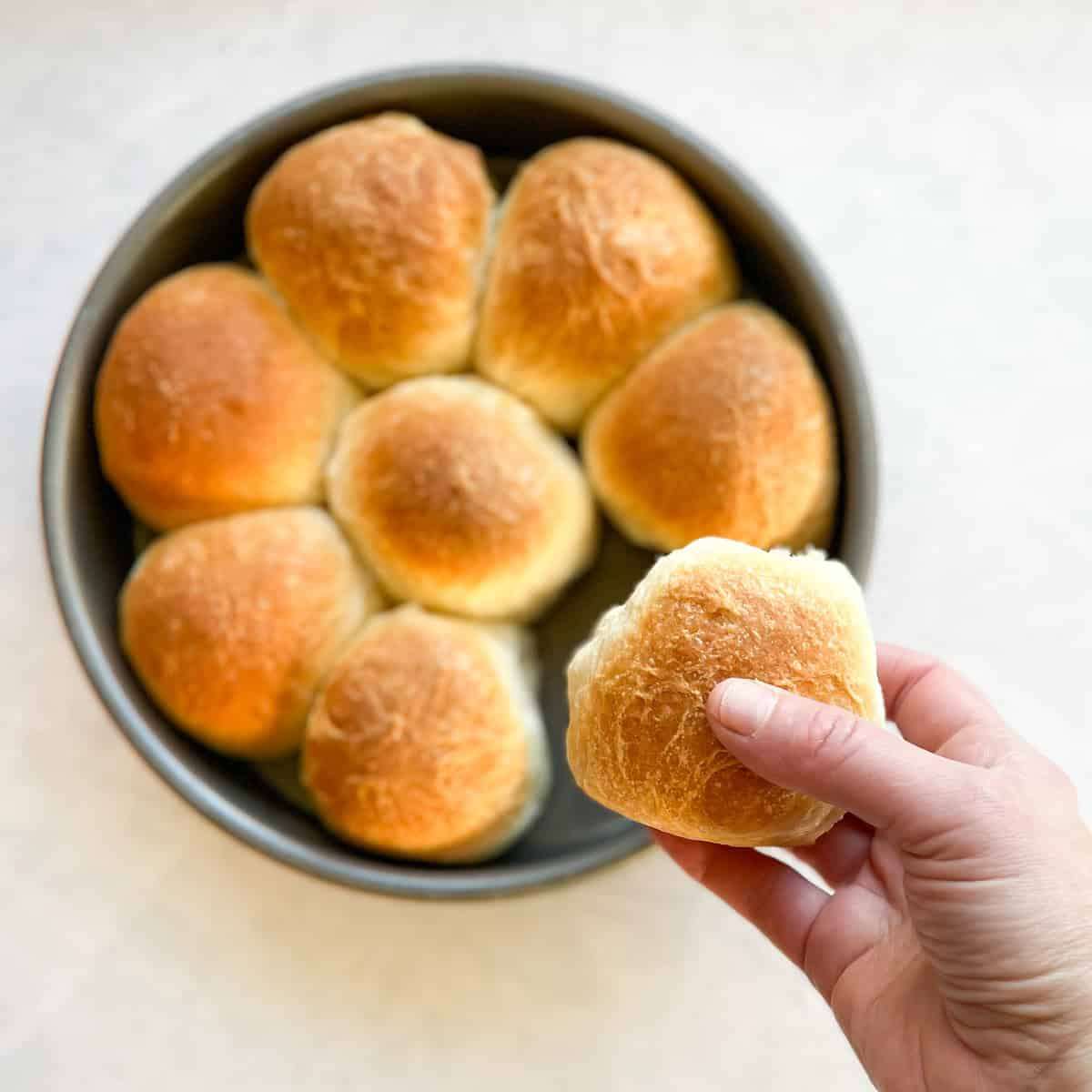
0 from 3 votes
Japanese Milk Bread Rolls
These Japanese Milk Bread Rolls are made with an enriched white bread recipe. They're soft and slightly sweet and perfect for serving with soups and stews, at Thanksgiving dinner, or as a sandwich bread.
Prep Time
1 hr
Cook Time
1 hr
Additional Time
3 hrs
Total Time
5 hrs
Servings: 16 rolls
Calories: 222 kcal
Course:
Bread
Cuisine:
International
Ingredients
Tangzhong (roux starter)
- ⅓ cup (45 grams) bread flour
- ½ cup (120ml) whole milk plus more as needed
- ½ cup (120ml) water
Dough
- 4 ⅔ cup (600 grams) bread flour plus more as needed
- ¼ cup (50 grams) granulated sugar
- 2 ¼ teaspoons instant yeast
- 2 teaspoons salt
- 2 large eggs
- roux starter
- 8 tablespoons (113 grams) unsalted butter softened and cut into small cubes, plus more for greasing the pan and brushing, if desired
Instructions
Tangzhong (roux starter)
- In a small pot, combine the flour, milk, and water. Over low heat, whisk until smooth and continue stirring until the whisk leaves a clear, thick track at the bottom of the pot.
- Remove the roux from the heat and scrape it into a glass measuring cup to stop the cooking. If you are not using it right away, cover the starter with plastic wrap, pressing down the wrap onto the surface of the roux to prevent a skin from forming and let cool.
Cup of Yum
Dough
- In the bowl of a mixer, use the paddle to combine the flour, sugar, and yeast and mix on low speed briefly. Add the salt and mix for about 10 seconds.
- Add the egg and the starter. Mix on low speed. When the dough starts to come together, switch to the dough hook. (If the dough doesn't come together, add an additional tablespoon of milk at a time).
- Increase the speed to medium and add the butter, one or two small cubes at a time. It should take a few minutes to finish adding the butter. Knead for about five to seven minutes more, adding flour as necessary if the dough sticks to the bottom of the mixer. At the end of kneading, the dough should be soft and tacky but not sticky.
- Shape the dough into a boule, cover the bowl with plastic wrap, and let it rise in a warm place until doubled in size, about one and a half to two hours.
- Lightly grease two 9 inch round cake pans.
- Divide the dough in half, and place one half into a bowl and cover it with plastic.
- Divide the remaining dough into eighths, and roll each portion into a ball (see the link below and in the main post for how to shape dinner rolls). Place the bread rolls in one cake pan so they are equally spaced and not touching. Repeat with the second half of the dough and second cake pan.
- Cover the cake pans with plastic wrap, and let the dough rise again in a warm, draft-free location until doubled in size, about 2 hours.
- Thirty minutes before baking, preheat the oven to 350°F.
- Brush with a tablespoon of melted butter, if you like, then bake for about 18 to 20 minutes until lightly browned and the internal temperature is 190°F.
- Serve warm or at room temperature.
Notes
- This recipe will make 16 dinner rolls or one loaf of Japanese milk bread and 8 dinner rolls.
- This video is a great example of how to shape dinner rolls.
- To make a sandwich loaf, grease a 9 inch by 5 inch loaf pan, and increase the baking time to 30 minutes.
Nutrition Information
Calories
222kcal
(11%)
Carbohydrates
33g
(11%)
Protein
6g
(12%)
Fat
7g
(11%)
Saturated Fat
4g
(20%)
Polyunsaturated Fat
1g
Monounsaturated Fat
2g
Trans Fat
0.2g
Cholesterol
37mg
(12%)
Sodium
304mg
(13%)
Potassium
76mg
(2%)
Fiber
1g
(4%)
Sugar
4g
(8%)
Vitamin A
220IU
(4%)
Vitamin C
0.01mg
(0%)
Calcium
21mg
(2%)
Iron
0.5mg
(3%)
Nutrition Facts
Serving: 16rolls
Amount Per Serving
Calories 222
% Daily Value*
| Calories | 222kcal | 11% |
| Carbohydrates | 33g | 11% |
| Protein | 6g | 12% |
| Fat | 7g | 11% |
| Saturated Fat | 4g | 20% |
| Polyunsaturated Fat | 1g | 6% |
| Monounsaturated Fat | 2g | 10% |
| Trans Fat | 0.2g | 10% |
| Cholesterol | 37mg | 12% |
| Sodium | 304mg | 13% |
| Potassium | 76mg | 2% |
| Fiber | 1g | 4% |
| Sugar | 4g | 8% |
| Vitamin A | 220IU | 4% |
| Vitamin C | 0.01mg | 0% |
| Calcium | 21mg | 2% |
| Iron | 0.5mg | 3% |
* Percent Daily Values are based on a 2,000 calorie diet.